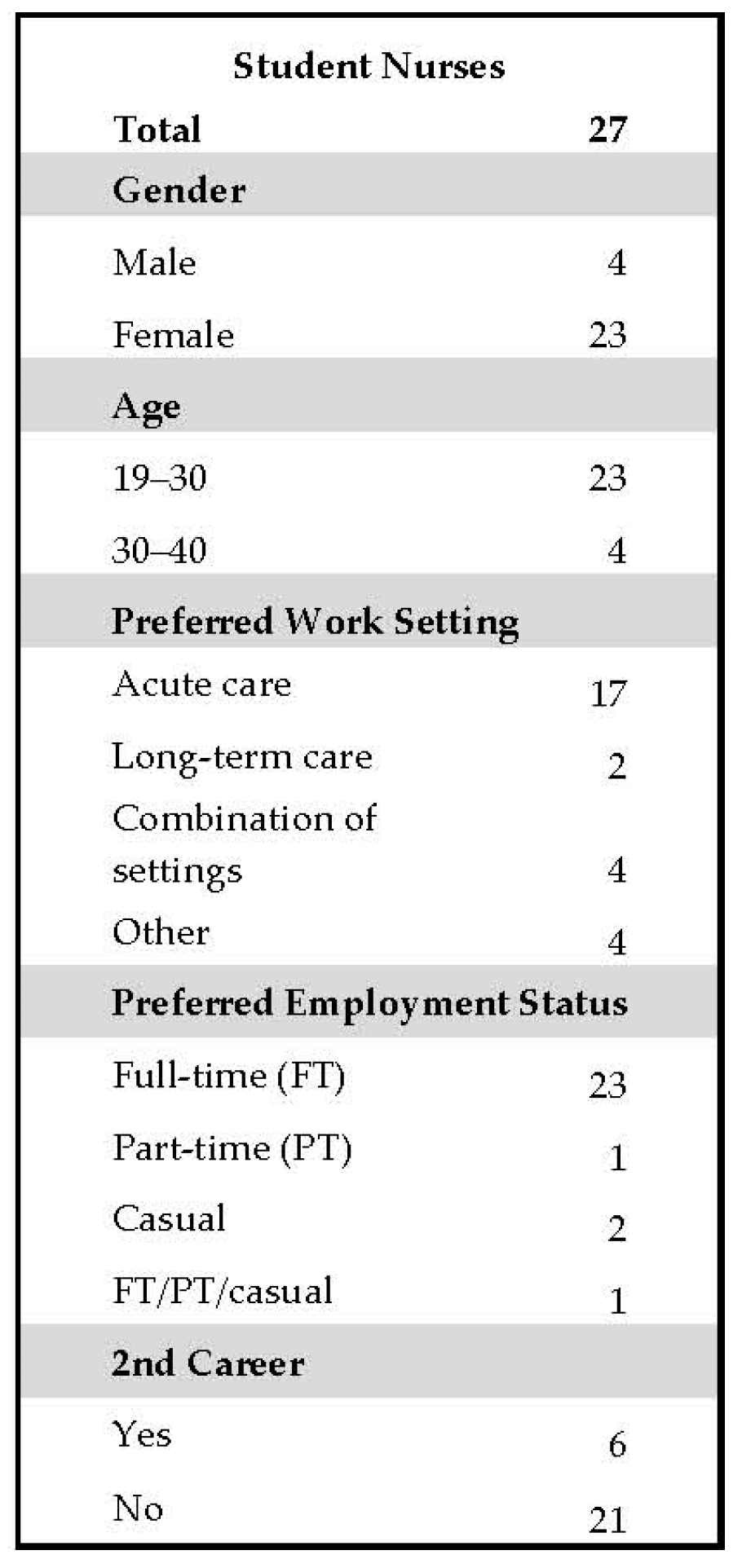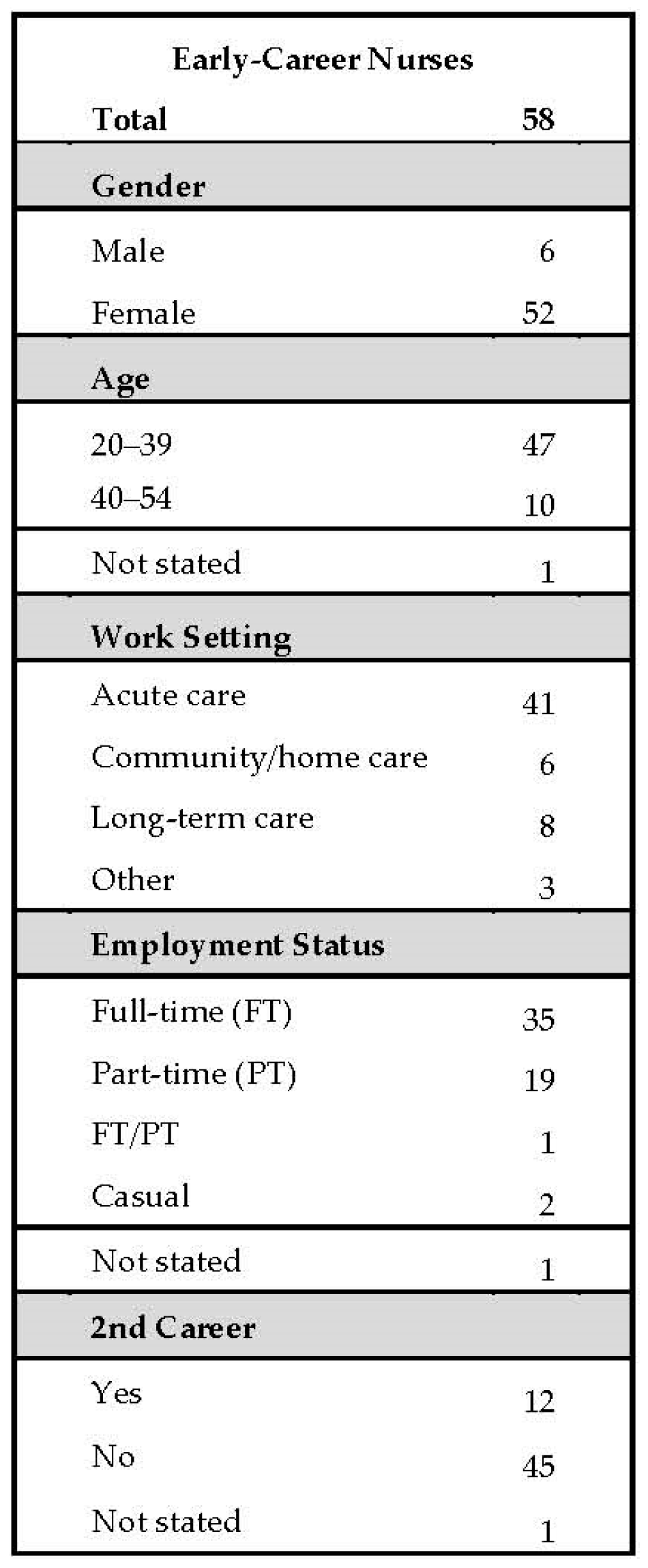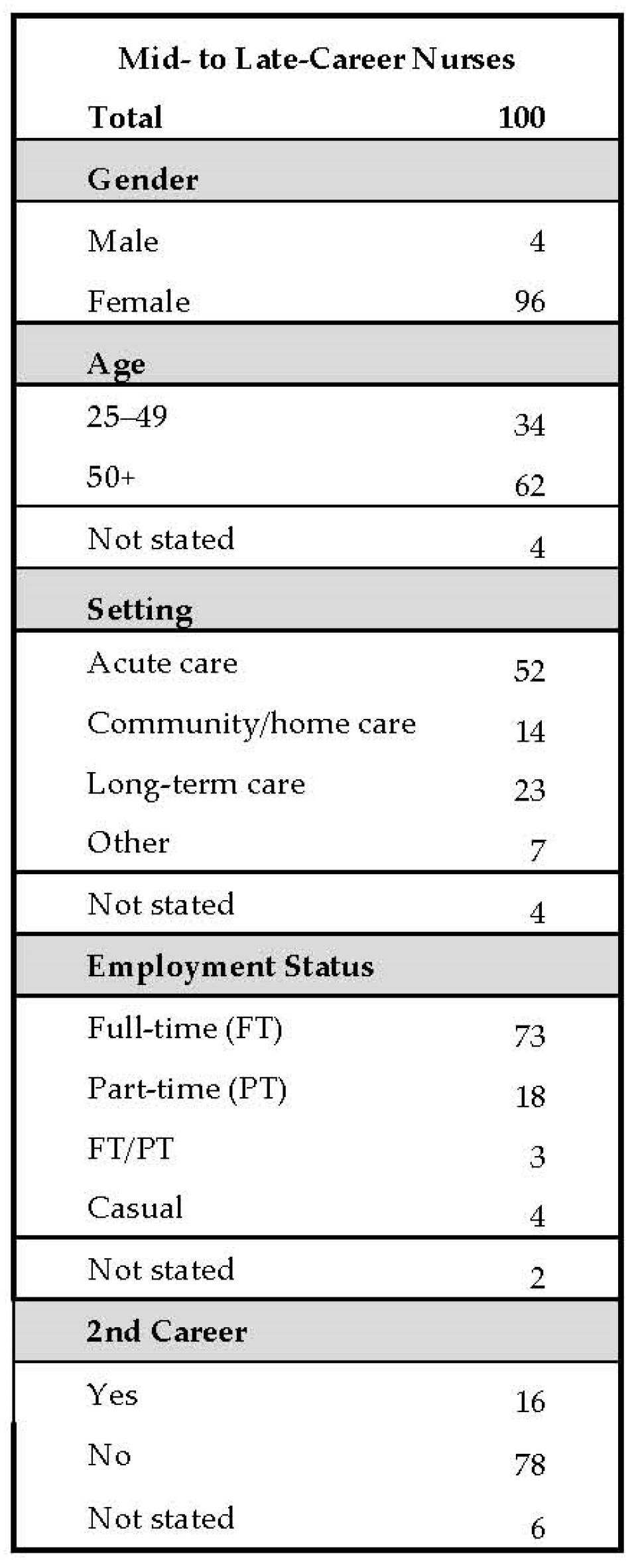The Importance of Continuing Professional Development to Career Satisfaction and Patient Care: Meeting the Needs of Novice to Mid- to Late-Career Nurses throughout Their Career Span
Abstract
:1. Introduction
2. Materials and Methods
2.1. Data Collection
2.2. Data Analysis
2.3. Limitations
3. Focus Group Results
3.1. Students
Student nurses wanted sufficient time to adjust to their new positions. Orientation programs were viewed as crucial to supporting successful transitions—a time in which students could increase their confidence and knowledge of unit-specific needs and protocols. Student nurses believed orientation programs were essential to their ability to confidently work on any unit.I think continuing education is huge, because when you graduate they encourage you to graduate as a generalist, and a lot of nursing is becoming very specific. So in order for you to, say, work in the ER, or the ICU, or palliative, or pediatrics, you need to have specialty courses.
Student nurses often identified that the workplace environment directly impacted their orientation experiences. Students recognized that understaffed units would negatively impact their orientation. Experienced nurses on understaffed units were often described as being too busy to properly orient and mentor student nurses, which made learning difficult.A proper orientation with time to adjust to where you’re going to be, regardless of if it’s your first job or your fifth job. I think because nursing is so broad, you actually need a proper orientation that can’t be skipped out on.
Several student nurses also expressed concern that the formal education they were receiving in school was not always adequately preparing them for real-world nursing environments. One nurse described only being trained to care for two to three patients but then ultimately being responsible to care for upwards of 10 patients when starting her career.When your nurse is not swamped by having five patients and can actually take the time to show you how to do things and oversee what you’re doing, you learn so much faster.
Collectively, student nurses described a lack of confidence in their skills upon graduation, which fueled their desire to receive more training and mentorship to increase their unit-specific skills.We’re coming onto these units where our patient ratios are off the chart, and we’re expected to function without having much time to figure out how to organize ourselves properly. We’ve only ever had two or three patients, no more than that, then all of a sudden you have 10, and we just don’t spend enough time on the floor; that on-the-job training, I think, is really lacking for lots of us.
3.2. Early-Career Nurses
When starting their career, early-career nurses felt support, guidance and training were essential to transition them from students to nurses. They wanted to feel supported during this initial career phase and looked to other nurses, mentors and preceptors for this support.[Nursing] has lots of different opportunities, ways to learn, and I’ve already found in the couple of years that I’ve been working—I’ve been learning every day.
Unfortunately, many early-career nurses described receiving inadequate orientation when starting their careers, which was often associated with a lack of staffing or time to train new hires. This left early-career nurses feeling unsupported, as if they had to “figure it out on [their] own”.I think that’s such a crucial period of time, right? You go from being a new student and learning all of this stuff in the classroom and out of a book, but going and actually practicing nursing and being out there...You just grow so much more, but to have that support during that period of time, it’s crucial. If you do have mentors and preceptors and co-workers who are supportive, it can be the most amazing experience, but if you don’t have that, it can be frightening.
Adding to an initial feeling of minimal support was the belief that their formal education did not always provide a realistic view of what their nursing career would look like.More often than not when I was orienting to the unit we’d be short-staffed so I’d have a patient with me.
Participants who described feeling supported in their student-to-career nurse transition often associated it with a new graduate transition program that provided these nurses with a feeling of confidence and preparedness.You have this idea of what it means to be a nurse when you’re in school, and you do your practicum, and you think you’re going to start nursing and you’re going to work in this really supportive environment, and patient-centred care is your priority. Then you go into the workforce, and your colleagues want to be supportive but they’re busy with their own assignments. So I kind of felt like you just get thrown in there and you have to figure things out as best you can...you feel like you’re out there alone.
Overall, many early-career nurses felt unprepared when starting their careers, and often they felt they were given too much responsibility too soon.What helped me the most with my career was—I graduated about a year ago now—was the new grad initiative, and I found that to be something very valuable in terms of transitioning from being a student nurse into a working nurse.
Once through the initial career transition from student nurse to working nurse, early-career nurses had a strong desire to continue their training and education. They described how they wanted to take part in educational opportunities and training sessions but often felt unsupported in their efforts. A lack of time off and minimal funding support often left early-career nurses unable to continue with the education and training that they desired.I had expected a lot more support as a new grad...I was trained for charge within two months of graduating, and I don’t feel that I was qualified to do that, but they said, ‘oh you can do it, you’ll be fine,’ and you’re a new grad so you say ‘okay,’ and thankfully nothing happened, but the expectation of new grads is very high.
We have a great general education that gives us a great head start, but now I’m looking for education, I’m looking for more specialized training and I’m finding it’s really hard to find.
Significant importance was given to the training and support that early-career nurses received from more senior nurses they worked with. In the absence of formal, structured orientations, education and training opportunities, this informal mentorship and support from more experienced nurses was especially important. Intraprofessional support was acknowledged as a valuable resource, especially for new graduates.If you’re expected to come in on your only two days off to do education, it just gets to the point where you don’t even want to come in.
I’m very pleased with the support that certain nurses have for other nurses...I find our support for each other is very strong.
Positive co-worker relationships and teamwork were often able to fill the training void that many early-career nurses described. However, it was noted by some that when the unit was busy or understaffed, very little assistance was possible from other nurses.It’s so important to just advocate for yourself if you can’t handle something. I’m very lucky at my hospital where our teamwork is so good, and I like the staff that I work with. I’m thankful for every day because when things like that happen, especially as a newer nurse, you need those seasoned nurses just to come and assess the patient and to sometimes even calm you down when you’re in a situation you’re not used to.
Early-career nurses described a commitment to continuing education and training in order to increase their preparedness and confidence in providing quality patient care. The provision of optimal care to patients was the primary impetus for their desire for ongoing learning and skills development. Although transition supports were identified as helpful for new graduates, early-career nurses recognized that educational opportunities were needed beyond their first few months as a novice. While other more experienced or ‘seasoned’ nurses were a resource for new nurses, in the absence of a formal support structure many participants described feeling as if they were “out there alone”.I think there’s an expectation when you go into nursing that you’re going to have more support from your co-workers. You don’t realize that they’re going to have a huge assignment too so they don’t really have time to mentor you as much as you might have imagined when you first came on.
3.3. Mid- to Late-Career Nurses
Mid- to late-career nurses recognized that there was an expectation for them to keep up with various training requirements and certifications. However, little support was provided to them at this later stage in their career in terms of getting time off or funding support for these educational initiatives.Educationally, I had to jump through hoops to get it done while I’m working full-time...They’d like you to have all these things behind your name so it looks good for the organization, but for them to facilitate you accomplishing half, or some of it, it doesn’t even exist right now.
Nurses described continuing education as an investment in their expertise. They believed continued training and education would improve the care they were able to provide to their patients, and it was disappointing to them that management did not see this as essential.Lack of opportunity for education, and if it is there, you foot the bill yourself, and they certainly don’t give you time off work to do it. They don’t foster an environment that allows growth and opportunity.
Mid- to late-career nurses described that education was prioritized by employers and managers in the earlier stages of their careers. However, they described being frustrated by the shift away from continuing education as a priority for employers in the later stages of their careers, where increased knowledge could enhance the quality of patient care.I’d like for my employer to look at me like an investment. If you’re paying me a salary then give me the opportunity for education with time off so that I will provide a higher level of care. I feel valued if I think my employer is going to invest time and money in me...If I’m happy I’m going to provide a higher level of care, so the patient is going to be happy.
For mid- to late-career nurses, the lack of support for continuing education seemed to further reflect management’s differing priorities and a lack of respect for their contributions to patient care. In addition, mid- to late-career nurses believed that although the nursing work environment relied heavily on their expertise, especially in the training and mentorship of new graduates, management often overlooked more senior nurses in terms of recognition and providing formal leadership opportunities.We need the time in order to take those courses. The other is financially. Back years ago in my career the employer used to pay for my registration in courses. Now they cry if they even have to pay for your wage for that day.
The opportunity for ongoing professional development and career progression opportunities not only were identified as demonstrating respect for mid- to late-career nurses’ expertise and organizational commitment, but also were recognized as key elements in optimizing patient care, enhancing work environments and retaining experienced nurses.Management will tend to empower the young ones, and you know what, I agree they’re our future, and we need them to have the knowledge and skill set that you gain over time, but I find that when they empower the younger ones, they disempower the people that they taught at the beginning. We’re the ones that taught them when they come into the system, and then once they get the knowledge and skills, management, sort of, supports backing them, and getting them into [leadership] roles instead of giving it to the senior nurses.
4. Discussion
5. Conclusions
Acknowledgments
Author Contributions
Conflicts of Interest
Appendix A
Appendix A.1. Student Demographics

Appendix A.2. Early-Career Nurse Demographics

Appendix A.3. Mid- to Late-Career Nurse Demographics

References
- Price, S. 2015. Bridging the Generational Divide: Nurses United in Providing Quality Patient Care. Ottawa, ON, Canada: CFNU. [Google Scholar]
- Wortsman, A., and A. Crupi. 2009. From Textbooks to Texting: Addressing Intergenerational Diversity in the Nursing Workplace. Ottawa, ON, Canada: CFNU. [Google Scholar]
- O’Brien-Pallas, L., G.T. Murphy, and J. Shamian. 2008. Final Report: Understanding the Costs and Outcomes of Nurses’ Turnover in Canadian Hospitals. Toronto, ON, Canada: University of Toronto Nursing Health Services Research Unit. [Google Scholar] [CrossRef]
- Beecroft, P.C., F. Dorey, and M. Wenten. 2008. Turnover intention in new graduate nurses: A multivariate analysis. J. Adv. Nurs. 62: 41–52. [Google Scholar] [CrossRef] [PubMed]
- Bowles, C.E., and L.E. Candela. 2005. First job experiences of recent RN graduates: Improving the work environment. J. Nurs. Adm. 35: 130–137. [Google Scholar] [CrossRef] [PubMed]
- Boychuk Duchscher, J.E., and L. Cowin. 2004. Multigenerational nurses in the workplace. J. Nurs. Adm. 34: 493–501. [Google Scholar] [CrossRef] [PubMed]
- Meyer Bratt, M., and H.M. Felzer. 2012. Predictors of new graduate nurses’ organizational commitment during a nurse residency program. J. Nurses Staff Dev. 28: 108–119. [Google Scholar] [CrossRef] [PubMed]
- Price, S. 2011. The Experience of Choosing Nursing as a Career: Narratives from Millennial Nurses. Ph.D. Thesis, University of Toronto, Toronto, ON, Canada. [Google Scholar]
- Zemke, R., C. Raines, and B. Filipczak. 2000. Generations at Work: Managing the Clash of Veterans, Boomers, Xers and Nexters in Your Workplace. New York, NY, USA: Amacom. [Google Scholar]
- Wolff, A.C., P.A. Ratner, S.L. Robinson, J.L. Oliffe, and L.M. Hall. 2010. Beyond generational differences: A literature review of the impact of relational diversity on nurses’ attitudes and work. J. Nurs. Manag. 18: 948–969. [Google Scholar] [CrossRef] [PubMed]
- Laschinger, H.K.S. 2012. Job and career satisfaction and turnover intentions of newly graduated nurses. J. Nurs. Manag. 20: 472–484. [Google Scholar] [CrossRef] [PubMed]
- Day, R., P. Field, I. Campbell, and L. Reutter. 2005. Students’ evolving beliefs about nursing: From entry to graduation in a four-year baccalaureate programme. Nurse Educ. Today 25: 636–643. [Google Scholar] [CrossRef] [PubMed]
- Kelly, J., and K. Ahern. 2009. Preparing nurses for practice: A phenomenological study of the new graduate in Australia. J. Clin. Nurs. 18: 910–918. [Google Scholar] [CrossRef] [PubMed]
- Kramer, M. 1974. Reality Shock: Why Nurses Leave Nursing? St. Louis, MO, USA: Mosby. [Google Scholar]
- McKenna, L., L. McCall, and N. Wray. 2010. Clinical placements and nursing students’ career planning: A qualitative exploration. Int. J. Nurs. Pract. 16: 176–182. [Google Scholar] [CrossRef] [PubMed]
- Kovner, C.T., C.S. Brewer, S. Fairchild, S. Poornima, H. Kim, and M. Djukic. 2007. Newly licensed RNs’ characteristics, work attitudes, and intentions to work. Am. J. Nurs. 107: 58–70. [Google Scholar] [CrossRef] [PubMed]
- McDonald, A.W., and P. Ward-Smith. 2012. A review of evidence-based strategies to retain graduate nurses in the profession. J. Nurses Staff Dev. 28: E16–E20. [Google Scholar] [CrossRef] [PubMed]
- Park, M., and C.B. Jones. 2010. A retention strategy for newly graduated nurses: An integrative review of orientation programs. J. Nurses Staff Dev. 26: 142–149. [Google Scholar] [CrossRef] [PubMed]
- Romyn, D.M., N. Linton, C. Giblin, B. Hendrickson, L.H. Limacher, C. Murray, and C.M. Zimmel. 2009. Successful transition of the new graduate nurse. Int. J. Nurs. Educ. Scholarsh. 6: 34. [Google Scholar] [CrossRef] [PubMed]
- Armstrong-Stassen, M., S. Cameron, D. Rajacich, and M. Freeman. 2014. Do nursing managers understand how to retain seasoned nurses? Perceptions of nurse managers and direct care nurses of valued human resource practices. Nurs. Econ. 32: 211. [Google Scholar]
- Armstrong-Stassen, M. 2005. Human resource management strategies and the retention of older RNs. Nurs. Leadersh. 18: 50–64. [Google Scholar] [CrossRef]
- McGillis Hall, L., M. Lalonde, L. Dales, J. Peterson, and L. Cripps. 2011. Strategies for retaining midcareer nurses. J. Nurs. Adm. 41: 531–537. [Google Scholar] [CrossRef] [PubMed]
- Canadian Institute for Health Information (CIHI). 2016. Regulated Nurses, 2015. Ottawa, ON, Canada: CIHI, p. 20. [Google Scholar]
- Jeffs, L., and V. Nincic. 2014. Maintaining Ontario’s Nursing Workforce: Evaluating the Impact of Ontario’s Late Career Initiative (LCNI) 2012–2013 (Final Report). Hamilton, ON, Canada: Nursing Health Services Research Unit. [Google Scholar]
- Bellefontaine, P., and V. Eden. 2012. Nova Scotia: Late career nurse and new graduate transition. Nurs. Leadersh. 25: 51–60. [Google Scholar] [CrossRef]
- Weidner, A., C. Graham, J. Smith, J. Aitken, and J. Odell. 2012. Alberta: Evaluation of nursing retention and recruitment programs. Nurs. Leadersh. 25: 130–147. [Google Scholar] [CrossRef]
- Canadian Nurses Association, and Canadian Federation of Nurses Unions. 2015. Joint Position Statement—Practice Environments. Maximizing Outcomes for Clients, Nurses and Organizations. Ottawa, ON, Canada: CNA, Ottawa, ON, Canada: CFNU. [Google Scholar]
© 2017 by the authors. Licensee MDPI, Basel, Switzerland. This article is an open access article distributed under the terms and conditions of the Creative Commons Attribution (CC BY) license (http://creativecommons.org/licenses/by/4.0/).
Share and Cite
Price, S.; Reichert, C. The Importance of Continuing Professional Development to Career Satisfaction and Patient Care: Meeting the Needs of Novice to Mid- to Late-Career Nurses throughout Their Career Span. Adm. Sci. 2017, 7, 17. https://doi.org/10.3390/admsci7020017
Price S, Reichert C. The Importance of Continuing Professional Development to Career Satisfaction and Patient Care: Meeting the Needs of Novice to Mid- to Late-Career Nurses throughout Their Career Span. Administrative Sciences. 2017; 7(2):17. https://doi.org/10.3390/admsci7020017
Chicago/Turabian StylePrice, Sheri, and Carol Reichert. 2017. "The Importance of Continuing Professional Development to Career Satisfaction and Patient Care: Meeting the Needs of Novice to Mid- to Late-Career Nurses throughout Their Career Span" Administrative Sciences 7, no. 2: 17. https://doi.org/10.3390/admsci7020017
APA StylePrice, S., & Reichert, C. (2017). The Importance of Continuing Professional Development to Career Satisfaction and Patient Care: Meeting the Needs of Novice to Mid- to Late-Career Nurses throughout Their Career Span. Administrative Sciences, 7(2), 17. https://doi.org/10.3390/admsci7020017




